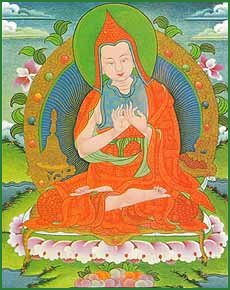The Great Chariot
by Longchenpa | 268,580 words
A Commentary on Great Perfection: The Nature of Mind, Easer of Weariness In Sanskrit the title is ‘Mahāsandhi-cittā-visranta-vṛtti-mahāratha-nāma’. In Tibetan ‘rDzogs pa chen po sems nyid ngal gso’i shing rta chen po shes bya ba ’...
Part 10a) The brief teaching of the six perfections
From the two methods of training in what should be practiced, the activity of the victorious ones.
As for the subject of how they should train
The Buddha’s children must train themselves in everything,
But chiefly in the practice of the six perfections.
The Friendly Letter says:
Generosity, discipline, patience and exertion,
Meditation, perfection of inscrutable prajña;
Developing these, we cross the ocean of samsara
And so produce the powers of a victorious one
Train in the way being explained. From the common nature and individual natures, within the common are also six individual natures, as follows:
Without conceptualizing the three spheres of actor, action, and object, good thoughts of giving our possessions to another, along with their seeds, are the perfection of generosity. Its action is to pacify the poverty of others.
Without conceptualizing the three objects, thoughts of abandoning the faults of samsara and nirvana, along with their seeds, are the perfection of discipline. Its action is to eliminate obstructions.
Without conceptualizing the three objects, bearing harm and weariness and not being afraid of their nature is the perfection of patience. Its action is agressionlessness.
Without conceptualizing the three objects, joy in virtue is the perfection of exertion. Its action is that merit increases.
Without conceptualizing of the three objects, one-pointed mind is the perfection of meditation. Its action is that the kleshas are pacified.
Without conceptualizing the three objects, realization of the nature of dharmas is the perfection of
prajña. Its action is that knowables are realized and, that we are liberated from samsara.
These perfections have four virtues:
- By envisioning enlightenment as the benefit for others they are vast.
- By establishing true goodness and loftiness, they are precious.
- By transcending the world, they are without materialism.
- By the increase of merit, they are inexhaustible.
The Mahayanasutralankara says:
Vast and not materialistic,
Precious and inexhaustible,
Of generosity and the others
We should know these four-fold virtues.
There is a fixed number of three stages.
1. Exaltedness is established and the kleshas abandoned.
The number of six subparts depending on that is fixed. Regarding them, the same text says:
Enjoyment and the body are both completely perfected.
By perfect acts and retinue we will be exalted.
We never again will be in the power of the kleshas,
And anything we do will always be correct.
2. By benefiting others, the benefit for oneself is established. The number of six subparts depending on that is also fixed. Here the same text says:
No longer impoverished and doing no harm at all,
Patient with injury and never weary of action,
We have excellent reasons for our feeling of rejoicing:
The benefit of others is our own benefit.
3. Depending on the three trainings explained below, the number of six perfections is fixed. Here the same text says:
Of the six perfections of the Victorious One,
When they are classified from the viewpoint of the three trainings
The explanation is that the first has three divisions
The second has two divisions, and the third has one.
One includes all three, with three divisions described.
The first three perfections are included in training in supreme discipline. Generosity is the cause, discipline the essence, and patience is the particular expression. The next two are classed as training the mind in meditation. Prajña is gathered under the training in prajña. Exertion alone gathers them all together, because of being associated with them all.
Describing the perfections as being in successive stages, the same text says:
The later depend on the earlier
Since they are lower and higher,
And since they are fine and coarse,
They are taught to be in stages.
Since the perfections arise in successive order from earlier to later, they form a series of causes and fruitions. Since discipline is more excellent than generosity etc., there is a gradation from worse to better. The earlier they are, the coarser they are, and the easier to understand and realize. The later they are, the subtler and more difficult they are, so there are gradations of fine and coarse. They are described from those three viewpoints.
As for the way of practicing, practice generosity with no hope of ripening. Again and again in this samsaric realm, guard discipline that does not aspire to the higher realms. To endure everything patiently, meditate on patience. Establish exertion that gathers all virtues together, meditation that clears away attachment to the formless realms and prajña such that it is inseparable with upaya. The same text says:
Generosity is without any hope.
Discipline has no wish for more samsara.
Patience is the bearer of everything.
Exertion is the gatherer up of virtue.
Likewise, dhyana is not formlessness.
Prajña is the possessor of upaya.
As for these, they are the six perfections.
By their stability we are united with truth.
As for the ascertaining features the same text says:
Removing poverty, gaining coolness, and bearing anger,
Union with passionlessness, and the grasp of mind
Are said to be done for the sake of knowing the absolute.
Removing poverty is generosity. Cooling the torments of the kleshas and guarding against them is discipline. Forbearance of inner anger is patience. Union with the level of buddhahood is exertion. One-pointedly grasping the mind is dhyana. Knowing the nature of dharmas, absolute truth, is prajña.
